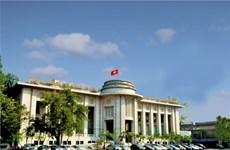Banks face fund raising challenges
Total deposits at credit institutions nationwide fell by 3.29 percent
compared with the figure recorded in late 2011, according to the State
Bank of Vietnam.
Total deposits at credit institutions nationwide fell by 3.29 percent
compared with the figure recorded in late 2011, according to the State
Bank of Vietnam.
Several lenders, particularly smaller ones, said they are still encountering difficulties in raising funds.
A representative of a joint-stock commercial bank in HCM City attributed the problem to the deposit interest rate that has been imposed at all banks. Most customers tend to deposit their savings in major banks.
The most common interest rates on non-term deposits quoted at commercial banks are between 4 percent and 6 percent per year.
The rates of deposits with terms of one month or more are 13 and 14 percent per annum.
The country's consumer price index ( CPI ) remains steady and has yet to decline, another factor in preventing people from pumping their savings into the banking system.
According to the General Statistics Office, the CPI in February increased by 1.37 per cent compared with that of January, and by 2.38 per cent compared with the figure in December.
Because of this, many people want to inject their savings into safer places, particularly gold, which is rising in price.
Many banks have also encountered obstacles in seeking capital on the inter-banking market.
Although the lending interest rates on the inter-bank market have become more stable, they are still higher than the deposit interest rate cap.
In particular, the interest rates on overnight loans on the inter-banking market are between 15 percent and 15.5 percent per year, and loans with three-week terms between 17 percent and 18 percent per year.
In addition, banks that want access to capital resources on this market also must meet some other strict requirements.
Pham Ngoc De, deputy general director of the Viet A Joint-Stock Commercial Bank (VietABank), also told Dau Tu (investment) newspaper that the volume of cash deposits at the banks will continue to be modest even if the prices of gold continue to climb.
Banks will still face challenges, partly because the pressure created from high interest rates cannot be eased immediately.
In addition, mobilising capital from people's savings will still be difficult, De said.-VNA
Several lenders, particularly smaller ones, said they are still encountering difficulties in raising funds.
A representative of a joint-stock commercial bank in HCM City attributed the problem to the deposit interest rate that has been imposed at all banks. Most customers tend to deposit their savings in major banks.
The most common interest rates on non-term deposits quoted at commercial banks are between 4 percent and 6 percent per year.
The rates of deposits with terms of one month or more are 13 and 14 percent per annum.
The country's consumer price index ( CPI ) remains steady and has yet to decline, another factor in preventing people from pumping their savings into the banking system.
According to the General Statistics Office, the CPI in February increased by 1.37 per cent compared with that of January, and by 2.38 per cent compared with the figure in December.
Because of this, many people want to inject their savings into safer places, particularly gold, which is rising in price.
Many banks have also encountered obstacles in seeking capital on the inter-banking market.
Although the lending interest rates on the inter-bank market have become more stable, they are still higher than the deposit interest rate cap.
In particular, the interest rates on overnight loans on the inter-banking market are between 15 percent and 15.5 percent per year, and loans with three-week terms between 17 percent and 18 percent per year.
In addition, banks that want access to capital resources on this market also must meet some other strict requirements.
Pham Ngoc De, deputy general director of the Viet A Joint-Stock Commercial Bank (VietABank), also told Dau Tu (investment) newspaper that the volume of cash deposits at the banks will continue to be modest even if the prices of gold continue to climb.
Banks will still face challenges, partly because the pressure created from high interest rates cannot be eased immediately.
In addition, mobilising capital from people's savings will still be difficult, De said.-VNA













